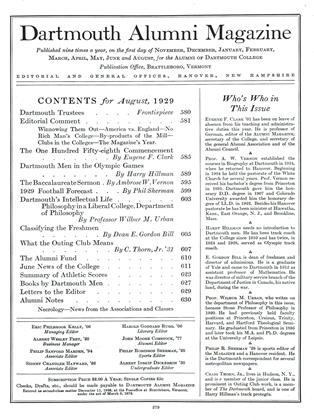But even the most radically inclined among us, quarrel as he may with writing 1929 as our year's number, does not think of writing it as the year 1. The past has delivered unto us its goods. We are the product of our fathers' God, of our fathers' faith and struggles, of the Christian religion. No one, surely, in all the range of human history has ever so dominated the minds and hopes and ideals of men, has so formed and transformed the springs of action of the foremost peoples of the earth as has Jesus Christ. He is largely responsible for ours. If the creeds that have been built around him have become poetic expressions of an outworn faith, we feel just as certain as Christ did, when he told this parable, that the spiritual forces of the vanishing age have left behind them their goods. They constitute the abiding ideals, the mighty hopes, the enduring values that make us men. They are our most priceless possessions. Indeed they are what we mean when striking beneath our bodies and minds we come on something that we call ourselves.
And so the outstanding question which you face as you leave college and take your place in the shaping of the world is, What do you mean to do in this time of religious and spiritual uncertainty with the goods that the past has inwoven in your spirits, your ideals, your
energies, your powersr You can, of course, scorn them, jeer at them, throw them to the winds. But, fortunately, neither in Jesus' time nor in ours, are there enough men of that temper to make the possibility worth considering.
 View Full Issue
View Full Issue
More From This Issue
-
 Class Notes
Class NotesCLASS OF 1879
August 1929 By Henry Melville -
 Article
ArticleAlumni Council Meetings
August 1929 -
 Article
ArticleThe One Hundred Fifty-Eighth Commencement
August 1929 By Eugene F. Clark -
 Class Notes
Class NotesCLASS OF 1899
August 1929 By Warren C. Kendall -
 Class Notes
Class NotesCLASS OF 1903
August 1929 By John Crowell -
 Class Notes
Class NotesCLASS OF 1918
August 1929 By Frederick W. Cassebeer
Ambrose W. Vernon
-
 Article
ArticleThe Baccalaureate Sermon
AUGUST 1929 By Ambrose W. Vernon -
 Article
ArticleTwo Courses Open
AUGUST 1929 By Ambrose W. Vernon -
 Article
ArticleResults of Risks
AUGUST 1929 By Ambrose W. Vernon -
 Article
ArticleDiscrimination in Risks
AUGUST 1929 By Ambrose W. Vernon -
 Article
ArticleTake the Nobler Risk
AUGUST 1929 By Ambrose W. Vernon -
 Article
ArticleThe Supreme Risk
AUGUST 1929 By Ambrose W. Vernon








